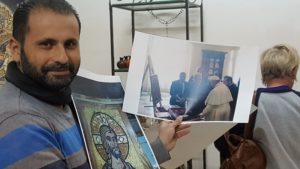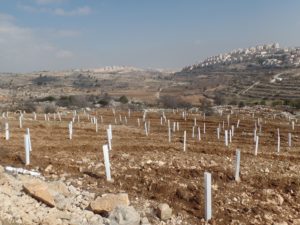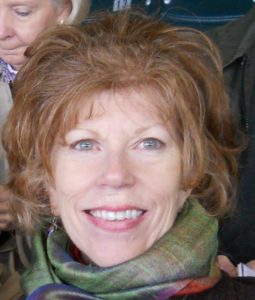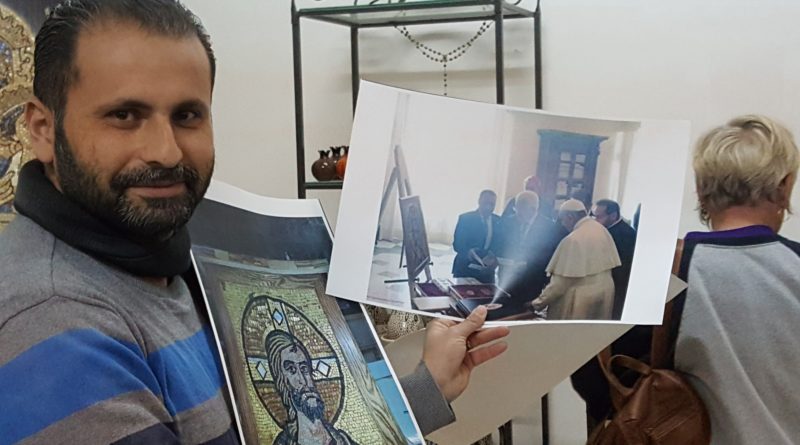Grace in Palestine by Laura Ruzicho

Down the street from our Bethlehem hotel in the village of Beit Sahour was the studio of a Palestinian mosaic artist. We met him on our Keep Hope Alive trip when we worked with Palestinian farmers to plant olive trees. Samer, the mosaic artist, has created stunning pieces for companies and individuals around the world, including a mosaic for Pope Francis. His studio is small but he welcomed us in, showed us his current projects and gave us a peek at his artistic process. You can still see ancient mosaic art in churches and ruins throughout Israel-Palestine, but to see the modern-day-more-efficient, but still-tedious, detailed process was a bit mind-boggling.
Over the days of our tree-planting trip, a few of us visited Samer’s studio several times to admire his work, to shop and to talk. We met Samer’s wife, his oldest son and his best friend Mario who is godfather to his children. Mario owns a restaurant in the town of Beit Sahour, which overlooks Shepherd’s Field where it is said angels visited the shepherds to proclaim Jesus’ birth. We got to know them a little and we talked about their lives in these places that for us have taken on mythical meaning.
We talked about art and food, which were easier subjects than the encroaching illegal Israeli settlements or the taking of homes in Bethlehem and surrounding communities by Jewish settlers. Then Samer invited us to his home for coffee on our last evening in Palestine. People are very welcoming in Palestine and we were graciously invited into their lives and homes, which gave us a view of life we didn’t expect.
Standing on the hillside balcony of Samer and his family’s apartment, we noticed the military fence, which separates Samer’s and other homes from much of Bethlehem. On the neighboring hillside loomed illegal Israeli settlements, or colonies, as some call them. These Israeli settlers are allowed to carry weapons, and the Israeli military is there to protect them from the people whose land they are taking. Palestinians, we learned, are not allowed weapons and can be arrested for holding a rock.
From the balcony, we saw the Church of the Nativity in the distance. This is the church that was built on the site of Jesus’ manger in Bethlehem. Looking at Bethlehem and the hills around us, a great sense of unease and sadness came over us on that clear, beautiful night on Samer’s balcony. Putting talk about art and food aside, one of us finally asked, “How do you cope with the quickening threats of violence and oppression?” “Hope,” said Samer. Mario added, “We have hope, because hope is all we have.”
This was hard for most of us to process, and showed us how important it is for mission work trips like ours to keep hope alive for them. Over the days we spent helping plant olive trees on the rugged land, we learned that many things are different in Palestine.
One big example is the sounds of Israel-Palestine, which are different from other countries I’ve visited. Particularly in the West Bank where we were planting with Palestinian farmers, we found that the sounds of grace and oppression live together in a shocking and visceral dichotomy.

While working on the land digging holes for the saplings, we heard the pounding, jackhammering noise of illegal Israeli settlement construction, expanding on Palestinian land all around us. It was common to hear Israeli soldiers question and block Palestinians – and only Palestinians – from accessing roads for jobs, doctor appointments and family visits. We learned that it is also common for our Palestinian guides and their families to be arrested for no reason other than to remind them of who’s in charge.
And each day, five times a day, we heard the Muslim Call to Prayer waft over us, wherever we were. We watched as some people stopped, knelt, and prayed, though many carried on and didn’t pray. Both were perfectly acceptable responses, it turned out, but the sights and sounds of prayer were never far away.
As the days went by, I came to look forward to this Call to Prayer. Although it was being sung in a language unfamiliar to me, I took it as a welcome to all, no matter our religion, to quiet ourselves for a few moments and pray. In this way, prayer became an important part of my days in Israel-Palestine. Five times a day, I had a reminder that God is always with me. And with all of us, no matter who we are, what our language of prayer is, and what tradition we pray through.
Ironic that in a land where people think there is no peace, there is the ubiquitous and calming presence of prayer. Back home in Florida, I miss hearing the Call to Prayer. But I remember that the sounds of God’s grace in those centering moments throughout the day help keep hope alive among the awful sounds of oppression that we were all witness to on our trip.
We cannot change the world with one visit, but we can shine a light on the oppression and illegal actions that are running Palestinians off their land and out of their homes. The Keep Hope Alive Olive Tree program is one good way we can help the Palestinians stay and live on their ancestral lands.
In February 2017, Rev. Dr. Jeff DeYoe, pastor of Covenant Presbyterian Church in Fort Myers, Florida, led a group on a Keep Hope Alive (KHA) trip to Israel/Palestine. The KHA trips are part of the East Jerusalem YMCA/YMVCA Joint Advocacy Initiative providing an international presence as solidarity and witness for the Palestinian olive harvest in the fall, and for olive tree planting in winter. This was Rev. DeYoe’s 5th trip to the region. The articles appearing this week are reports from the ground by “people in the pews” who went with him and stood as witness. Each traveler approached the trip from a different place in their faith and life journey. Through these posts edited by Noushin Framke, Ecclesio is pleased to take you to the olive groves in Palestine through their varied lenses.
 Laura Ruzicho is a two-time participant of Keep Hope Alive trips and is a member of Covenant Presbyterian Church in Fort Myers, FL, where she serves as a Stephen Minister and is involved in local mission work. She has worked in public relations and client service in various industries during her career.
Laura Ruzicho is a two-time participant of Keep Hope Alive trips and is a member of Covenant Presbyterian Church in Fort Myers, FL, where she serves as a Stephen Minister and is involved in local mission work. She has worked in public relations and client service in various industries during her career.


Pingback: De genade van het gebed in Israël en Palestina | Kairos-Sabeel Nederland